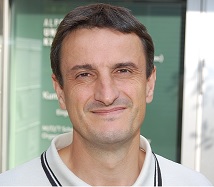 Abstract: People spend about 70% of the time in their homes sleeping, eating, doing housework, entertaining, etc. Therefore, it is not surprising that people try to make their homes as fullfilling as possible. Technological progress has provided a huge variety of possible enhancements to the quality of life, through so-called „smart“ devices and “smart” functionality. Although smart appliances for the home have been available on the market for decades, they haven’t reached a critical mass in the private home sector. In this talk the potential reasons for this are discussed and examples of state-of-the-art smart functions are provided and evaluated from different scientific perspectives, with a specific focus on the overlap area between computer sciences and psychology – human computer interaction. On the basis of the human-centric design approach, we propose a new concept: “the Wise Home”. The wise home differentiates itself from the smart home by being more supportive to the requirements and needs of humans, rather than over the assumption of responsibility based on a misunderstanding of what it means to be “smart”.
Abstract: People spend about 70% of the time in their homes sleeping, eating, doing housework, entertaining, etc. Therefore, it is not surprising that people try to make their homes as fullfilling as possible. Technological progress has provided a huge variety of possible enhancements to the quality of life, through so-called „smart“ devices and “smart” functionality. Although smart appliances for the home have been available on the market for decades, they haven’t reached a critical mass in the private home sector. In this talk the potential reasons for this are discussed and examples of state-of-the-art smart functions are provided and evaluated from different scientific perspectives, with a specific focus on the overlap area between computer sciences and psychology – human computer interaction. On the basis of the human-centric design approach, we propose a new concept: “the Wise Home”. The wise home differentiates itself from the smart home by being more supportive to the requirements and needs of humans, rather than over the assumption of responsibility based on a misunderstanding of what it means to be “smart”.
CV: Gerhard Leitner is assistant professor in the Interactive Systems Research Group (Prof. Martin Hitz) at the University of Klagenfurt. He holds a Master’s Degree in Applied Psychology from Vienna University, and a PHD in the interdisciplinary field of Human Computer Interaction from the University of Klagenfurt. Mr. Leitner worked as a usability consultant at the CURE Institute (Center for Usability Research and Engineering) and within the Kabel New Media network of excellence for companies such as ZDF, OEBB, and Raiffeisen. His current research interests are Usability and User Experience in regard to ambient intelligence with a specific focus on smart living environments.

 Abstract: Software is omnipresent. It is key to successful businesses and has become key to our social activities. As many systems, also software systems need to change in order to stay successful on the market. However, these changes cause software systems to become larger in size and more complex as described by Lehman’s Laws of Software Evolution. As a consequence, more resources are needed to maintain, or in general, evolve a software system. Evolving software systems is therefore mastering change and system complexity. The goal of my research and teaching is to provide software engineers with means to master this challenge.
Abstract: Software is omnipresent. It is key to successful businesses and has become key to our social activities. As many systems, also software systems need to change in order to stay successful on the market. However, these changes cause software systems to become larger in size and more complex as described by Lehman’s Laws of Software Evolution. As a consequence, more resources are needed to maintain, or in general, evolve a software system. Evolving software systems is therefore mastering change and system complexity. The goal of my research and teaching is to provide software engineers with means to master this challenge.